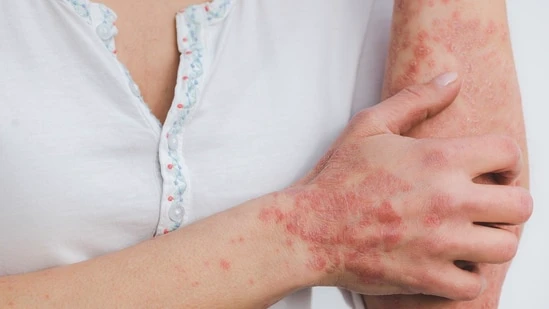Psoriasis is a chronic autoimmune skin disease that leads to red, itchy and scaly patches of skin and usually worsens in wet and cool temperatures.
The monsoon season, with less sunlight and more humidity can make psoriasis conditions worsen. In an interview with HT Lifestyle, Dr. Priyanka Kuri, consultant, dermatology, Aster Whitefield Hospital, Bengaluru said, “During monsoon, humidity is high, and temperature is low, causing the skin to lose moisture faster. This combination of dry, cool weather and low sun exposure can worsen psoriasis-related symptoms.” Psoriasis: Symptoms and treatment options
What makes psoriasis worse in monsoon?
1. High humidity: The moist and sticky environment can irritate the skin and potentially lead to fungal (like athlete’s foot) or bacterial infections that might trigger an episode of psoriasis.
2. Less sunshine: UV rays are important for slowing excess skin cell turnover which is why plaques become worse during monsoon season when we do not get as much natural light.
3. Temperature changes: Moving from cold outdoor air to a warm indoor environment can strip moisture from your skin, leaving it dry and dehydrated.
4. Stress and seasonal illnesses: Other typical monsoon sicknesses like colds or sore throats may trigger immune responses that add to worsening psoriasis.
 Managing psoriasis in the rainy season:
Managing psoriasis in the rainy season:
Dr Priyanka Kuri further shared a few tips to manage psoriasis symptoms in the monsoon season:
- Moisturise every day: Use unscented, thick cream or ointment moisturiser to keep your skin moist.
- Avoid hot showers: Avoid taking hot showers to prevent extra drying of your skin.
- Choose breathable fabrics: Choose cotton fabric to reduce friction and irritation to the skin.
- Increase your immune function: Eat whole foods and plenty of omega-3, vitamins, and antioxidants
- Keep up with your treatment plan: If your prescription involved topical medication or phototherapy, continue with that.
“”People routinely discontinue their psoriasis treatment during the rainy season. Psoriasis is a long-term illness and must be always taken care of. Stopping your treatment will slow your improvement and introduce unpleasant flare-up effects that you may not have expected,” the dermatologist warned.
